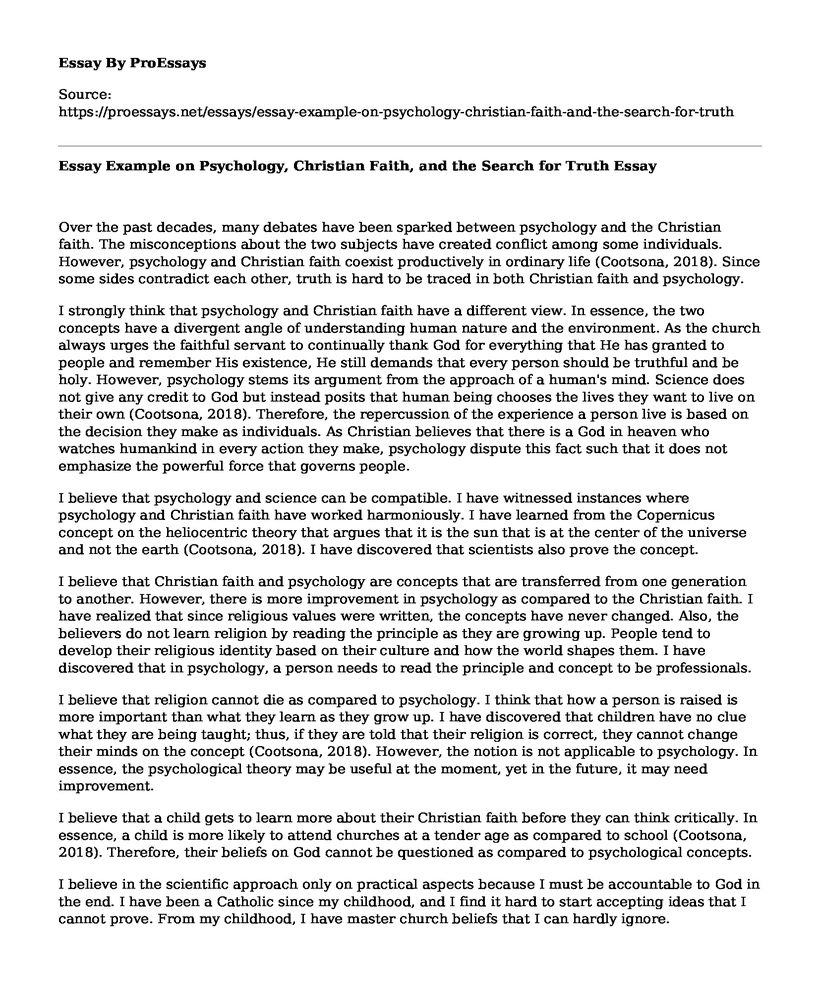Over the past decades, many debates have been sparked between psychology and the Christian faith. The misconceptions about the two subjects have created conflict among some individuals. However, psychology and Christian faith coexist productively in ordinary life (Cootsona, 2018). Since some sides contradict each other, truth is hard to be traced in both Christian faith and psychology.
I strongly think that psychology and Christian faith have a different view. In essence, the two concepts have a divergent angle of understanding human nature and the environment. As the church always urges the faithful servant to continually thank God for everything that He has granted to people and remember His existence, He still demands that every person should be truthful and be holy. However, psychology stems its argument from the approach of a human's mind. Science does not give any credit to God but instead posits that human being chooses the lives they want to live on their own (Cootsona, 2018). Therefore, the repercussion of the experience a person live is based on the decision they make as individuals. As Christian believes that there is a God in heaven who watches humankind in every action they make, psychology dispute this fact such that it does not emphasize the powerful force that governs people.
I believe that psychology and science can be compatible. I have witnessed instances where psychology and Christian faith have worked harmoniously. I have learned from the Copernicus concept on the heliocentric theory that argues that it is the sun that is at the center of the universe and not the earth (Cootsona, 2018). I have discovered that scientists also prove the concept.
I believe that Christian faith and psychology are concepts that are transferred from one generation to another. However, there is more improvement in psychology as compared to the Christian faith. I have realized that since religious values were written, the concepts have never changed. Also, the believers do not learn religion by reading the principle as they are growing up. People tend to develop their religious identity based on their culture and how the world shapes them. I have discovered that in psychology, a person needs to read the principle and concept to be professionals.
I believe that religion cannot die as compared to psychology. I think that how a person is raised is more important than what they learn as they grow up. I have discovered that children have no clue what they are being taught; thus, if they are told that their religion is correct, they cannot change their minds on the concept (Cootsona, 2018). However, the notion is not applicable to psychology. In essence, the psychological theory may be useful at the moment, yet in the future, it may need improvement.
I believe that a child gets to learn more about their Christian faith before they can think critically. In essence, a child is more likely to attend churches at a tender age as compared to school (Cootsona, 2018). Therefore, their beliefs on God cannot be questioned as compared to psychological concepts.
I believe in the scientific approach only on practical aspects because I must be accountable to God in the end. I have been a Catholic since my childhood, and I find it hard to start accepting ideas that I cannot prove. From my childhood, I have master church beliefs that I can hardly ignore.
References
Cootsona, G. (2018). Mere Science and Christian Faith: Bridging the Divide with Emerging Adults. InterVarsity Press.
Cite this page
Essay Example on Psychology, Christian Faith, and the Search for Truth. (2023, Apr 24). Retrieved from https://proessays.net/essays/essay-example-on-psychology-christian-faith-and-the-search-for-truth
If you are the original author of this essay and no longer wish to have it published on the ProEssays website, please click below to request its removal:
- Success Path Exploration in Poetry - Literary Essay Example
- Morality of Suicide: The Divergent and Convergent Views
- Nursing and Matters of Spirituality and Meaning of Life Paper Example
- Sin and the Effects of Sin Paper Example
- Essay on the Long-Term Impact of Sri Lanka's Disaster: PTSD and Its Effect on Survivors
- Essay Example on Jane's 2nd Admisn: Psychotic Episodes & Depression
- Book Review Sample on Ottoman and Post-Ottoman Lands







